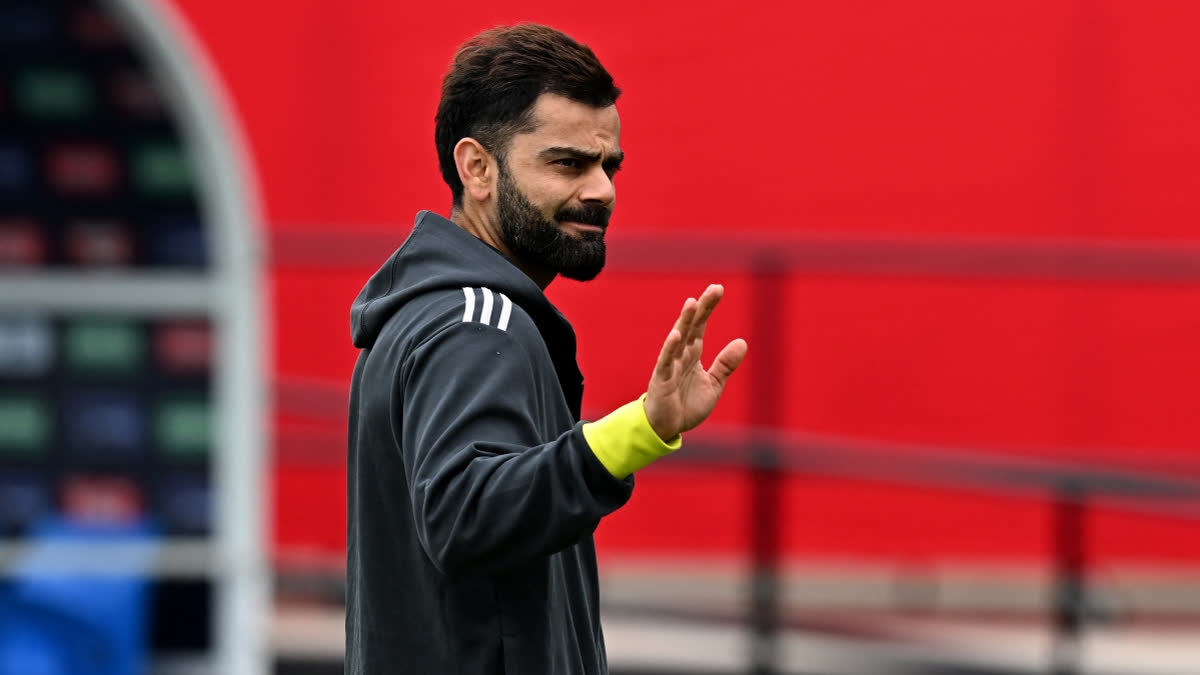Hyderabad: Ace India batter Virat Kohli is currently enjoying vacations with his family in London as the Indian cricket team didn't have any international games in any format till September 19. India will begin its home season with the start of the Test series against Bangladesh at home and Kohli is expected to appear in the series as he has already said goodbye to the shortest format of the game and there is no ODI match scheduled for India in the remainder of the year.
Kohli was recently spotted in a rare public appearance on the streets of London. A video clip capturing Kohli crossing a street in London went viral on social media as fans eagerly shared and commented on the clip. The cricketer was seen with his wife, Bollywood actress Anushka Sharma, and their newborn son, Akaay.
In a video posted by Royal Challengers Bengaluru (RCB) on social media, Kohli said, "So, it's just about not leaving anything behind and not having any regrets later, which I'm very sure I won't. Once I'm done, I'll be gone; you won't see me for a while. So, I want to give it everything I have till the time I play and that's the only thing that keeps me going."
This has raised one more big question: will Virat Kohli be able to play for India if he gets UK citizenship? What are the provisions made by the International Cricket Council (ICC) and Board for Control of Cricket in India (BCCI) for such cases?
What Does ICC Say?
Will Virat Kohli take England's citizenship is a different question, but if he gets it, it will come up to the rules made by the sport's governing body. The ICC has a few rules regarding citizenship and eligibility for playing cricket, which states that a player must be a national of the country they are representing to play for their national cricket team. This can be demonstrated by being born in the country, or by possessing a valid passport from the country.
That means they should have a passport from the country they represent. If Virat takes UK citizenship, he will not have a passport issued by India and hence Virat will not be able to play cricket for Team India.
" i wanna give it everything i have till the time i play, and that's the only thing that keeps me going" 🤌
— Royal Challengers Bengaluru (@RCBTweets) May 15, 2024
virat's emotional but promising words while talking at the @qatarairways Royal Gala Dinner. 🗣️#PlayBold #ನಮ್ಮRCB #IPL2024 pic.twitter.com/htDczGQpNf
What Are Indian Citizenship Laws?
India does not have an official provision to give dual citizenship. Dual citizenship is when a single person is legally recognized as a citizen of two or more countries at the same time. However, there is an Overseas Citizen of India (OCI) card that allows people of Indian origin to live and work in the country indefinitely.
If Kohli takes UK citizenship, he can apply for an OCI card. But, this does not work for playing cricket for the country. An OCI card is not equivalent to Indian citizenship.
The Kohli Scenario
Kohli would not be eligible to play for India unless he renounced his UK citizenship. If Kohli wants to become a UK citizen, he needs to revert to being solely an Indian citizen. However, this is highly unlikely to happen considering his stature and history with the Indian team.
In other possibilities, if Kohli wishes to play for another country, he will have to wait a certain period and play that country's domestic cricket after last representing India, as per ICC rules. Kohli is currently in the twilight of his career and has already hung up his boots from the shortest format of the game, hence it is highly impossible that the Indian cricketer will change the country just to play cricket.
Historical Precedents
Cricket has seen many players switching nationalities to get a chance to play on the international stage. There are many famous cricketers the likes of Eoin Morgan, who won the 2019 ODI World Cup with England as a captain and represented Ireland in the 2007 ODI World Cup. The other example is Kevin Pietersen, who played for England after initially representing South Africa, then Dirk Nanes, who represented the Netherlands in the 2009 T20 World Cup and played for Australia in the 2010 edition.
But, such transitions usually occur before players have established themselves as icons for their original countries, unlike Kohli.



